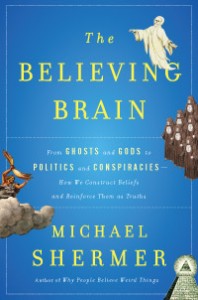As the circus that is the Republican presidential sweepstakes pulls into New Hampshire, local legislators seem to be working overtime to shift the political pendulum even further to the right. And by doing so they’re threatening to destroy both religion and science.
Two anti-evolution bills have just been introduced and will be taken up by the New Hampshire legislature in February. The first, the handiwork of Republican legislators Gary Hopper and John Burt, is little more than the standard anti-intellectual attack on evolution claiming that evolution is “only a theory” and thus shouldn’t be presented as fact in science classes. The only thing that makes this attempt to keep students from learning the best science possible different from similar failed attempts elsewhere is the fact that Hopper didn’t hide his motives as well as other legislators have.
As the Concord Monitor noted, “Hopper points to the state constitution and its order that teachers support their students’ ‘morality and piety’ for the justification of his bill.” The article goes on to explain, “He would like to see intelligent design – the idea that a creator controlled how early life on Earth developed – taught in classrooms, but hasn’t been able to find an example of the philosophy being successfully legislated into schools.”
Of course Hopper hasn’t found an example of intelligent design successfully legislated into public schools. How could he? Intelligent design, after all, is nothing more than standard-fare creationism gussied up to look like something it isn’t – and even with its fancy accoutrements, it has never passed legal muster. Simply put, as the courts have determined, teaching intelligent design in public schools tramples on the constitution’s first amendment protection by promoting one particular form of religion in the name of science.
As ridiculous as all of this is, it doesn’t compare to the looniness that defines the second anti-evolution bill. This one, introduced by Republican Jerry Bergevin, also demands that evolution be taught as a theory (as if there’s any other way to teach it), but it goes much further. It would require that public school science classes be dramatically expanded to explicitly include politics and religion. Bizarrely, Bergevin demands that students be taught about the personal opinions, opinions unrelated to science, of the scientists, from Darwin to the present, who are responsible for the theory of evolution. Just so you know I’m not making this stuff up, here’s what the bill requires students learn: “the theorists’ political and ideological viewpoints and their position on the concept of atheism.”
As oddly worded as that is, it’s far more coherent than how Bergevin justified his position to the Monitor. Here, in full, is what he had to say:
I want the full portrait of evolution and the people who came up with the ideas to be presented. It’s a worldview and it’s godless. Atheism has been tried in various societies, and they’ve been pretty criminal domestically and internationally. The Soviet Union, Cuba, the Nazis, China today: they don’t respect human rights. As a general court we should be concerned with criminal ideas like this and how we are teaching it. . . . Columbine, remember that? They were believers in evolution. That’s evidence right there. (ellipsis in original)
It’s all but impossible to know where to begin to set the record straight – or if it’s even worth the effort to do so. Recognizing the hopelessness of the task, let me make just a couple of points.
First, Bergevin is channeling Tom DeLay, the indicted former congressman from Texas, when he points to the Columbine tragedy as a reason to steer clear of evolution. DeLay famously had his own incoherent moment on this topic on the floor of the House when proclaimed that Columbine happened “because our school systems teach our children that they are nothing but glorified apes who have evolutionized (sic) out of some primordial mud.”
Second, Bergevin seems to have no sense of what happened in the Soviet Union when it outlawed the basics of evolutionary theory. T.D. Lysenko, the dominant Soviet voice in genetics from the mid-1930s to the mid-1960s, felt that evolutionary theory had too many capitalistic overtones and demanded that genetics research in the Soviet Union conform with Marxist ideology. The result? The loss of an entire generation of agricultural geneticists and the decimation of Soviet agronomy leading to massive wheat shortages.
Third, scientific knowledge must be judged independently of the political beliefs of scientists. Whether an idea has standing within the scientific community should be a result of the data in support of that idea and not whether you like the politics of the scientist proposing the idea. Scientific knowledge, but not the creation of public policy based on science, is independent of politics.
Fourth, evolutionary theory has absolutely nothing to do with religion and it certainly makes no statements about the viability of atheism. As I’ve said so many times before, the very existence of The Clergy Letter Project demonstrates that thousands of religious leaders have absolutely no trouble embracing evolution while remaining true to their faith. Yes, one narrow view of religion, the view that Bergevin seems to be embracing, has a problem with modern science, but we should recognize it for the narrow perspective that it is.
None of this is new – and all of it becomes incredibly tiresome. So why should we care? Simply, it’s important that we consistently resist anti-intellectual, anti-science and anti-religious legislation of this sort whenever it appears because if we don’t, we run the risk of further destroying our scientific infrastructure and limiting our religious freedoms.
The US Supreme Court perhaps said it best in 1968 when it unanimously ruled that Arkansas’s creationism law was unconstitutional: “The antecedents of today’s decision are many and unmistakable. They are rooted in the foundation soil of our Nation. They are fundamental to freedom.”
Forty four years later, those words remain every bit as powerful and every bit as important. Perhaps it would be useful if some legislators spent some time studying history rather than attempting to dismantle science education.
Michael Zimmerman, Ph.D.
Founder, The Clergy Letter Project
 February 2012
February 2012 Coming in
Coming in